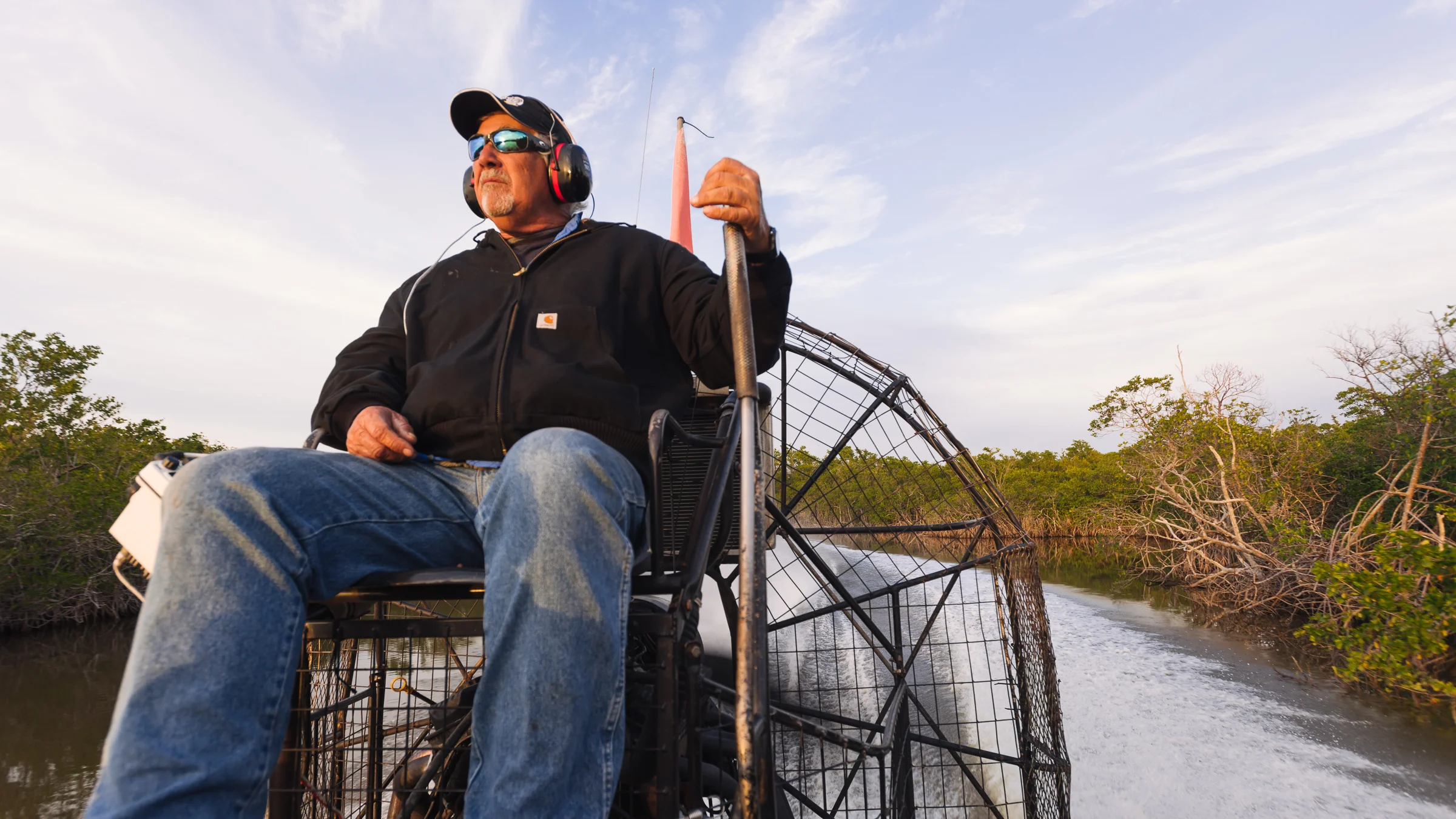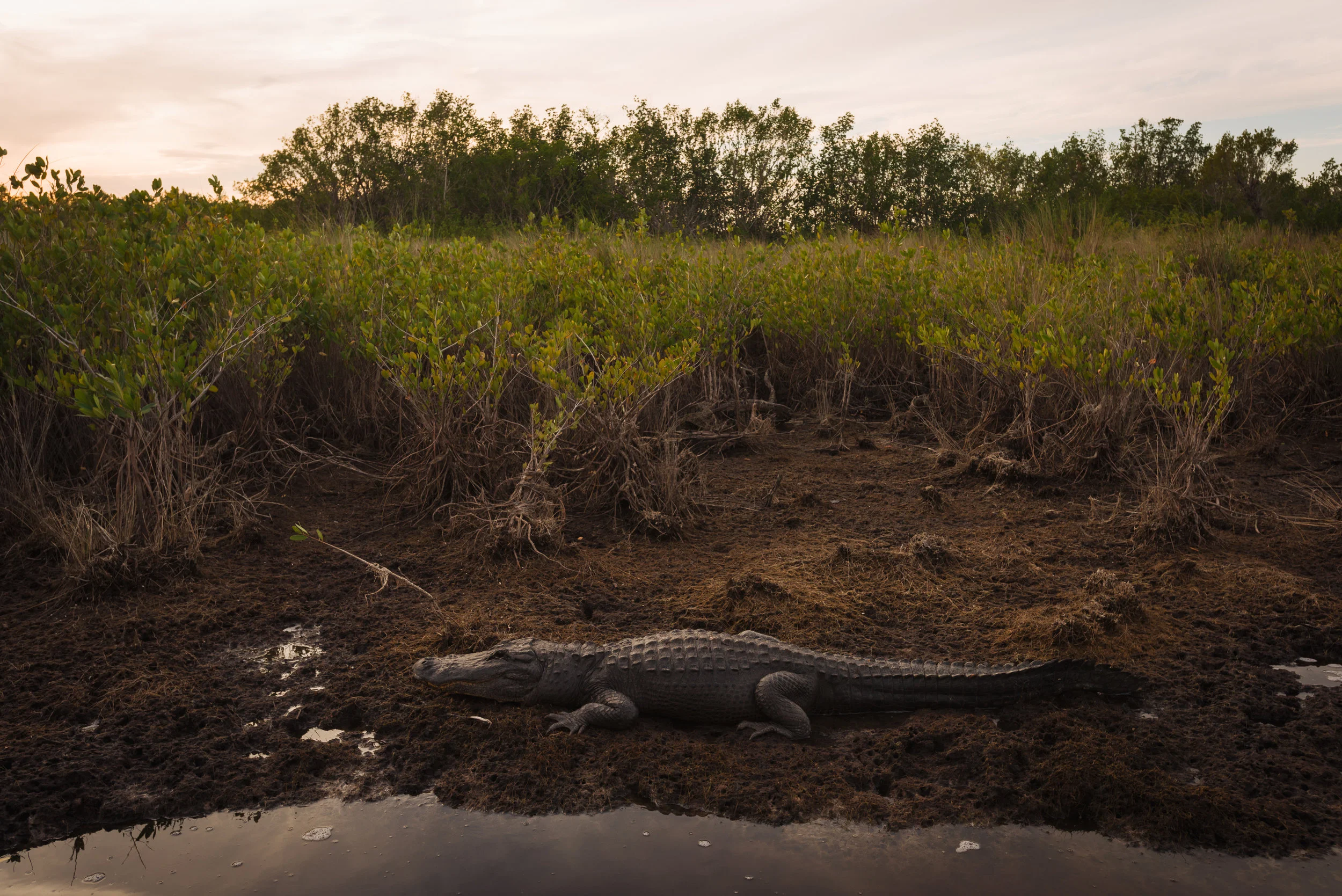Hoss of the Everglades
/Story by Jordyn Rozensky | Photographs by Justin Hamel
The paths through the Everglades are as twisted as the mangrove trees that grow there. Between its shifting sandbars, overgrown paths, and toothy alligators, the Everglades might as well have a sign: “Abandon hope, all ye who enter here.” Even the maps come with a caveat: Seek local knowledge.
Luckily for us, no one has more local knowledge than Hoss. An eighth-generation Evergladian, Hoss understands the twists and turns of the overgrown swamp paths better than he understands the rest of the world. He says his childhood pet was a Florida panther who grew large enough to rest her oversized paws on his shoulders and purr in his ear. The only real time he's spent away from his home was three tours of duty in the Vietnam War — and a brief stint in a Colombian prison (but we'll get to that).
When we first meet Hoss, he is preparing to take a group of tourists on an airboat trip through the Everglades.
"Airboats have no brakes,” he tells the tourists. “We can't make any sudden stops. Now, since Irma, we've been having a lot of problems with snakes. I don't know why, but they've been falling out of trees and into our boats. I can't stop if this happens — so just brush it off of you and onto the boat. Don't grab at it: It'll bite you. Just brush it off."
"You're joking, right?" is the response from a well-coiffed tourist who arrived at the dock with her own portable glass of chardonnay.
"Do I look like I'm joking?" Hoss retorts, in a tone that makes his feelings about the matter rather unclear. A minute later, he pulls a rubber snake from his pocket and tosses it at her, laughing.
Hoss grew up in the Everglades; he spent nights in a small boat with his dad, poaching alligators. Florida’s 1985 ban on fishing with nets made commercial fishing harder and harder, so Hoss made his money smuggling marijuana. With his knowledge of the area and ability to navigate in the dark, he could run full boatloads of weed from the shores of Colombia up into Florida. The money was good — almost excessively good.
When he was detained in Colombia, the cash came in handy: A quick payoff meant a nearly immediate release. Hoss didn't worry about appearances in Everglades City. It might have looked suspicious to outsiders to see an unemployed fisherman in a small, down-on-its-luck town with his own fleet of luxury cars, but Hoss wasn't an exception. Like poaching alligators, hauling weed was a family operation. Hoss' father, uncle, and two brothers all smuggled marijuana.
Hoss' inevitable arrest was a family occasion, too; his brothers, father, and uncle were arrested alongside him. Hoss told me he was one of 97 arrested in one night, which, according to my later search of the Miami Herald archives, may or may not be 100 percent accurate. It is, however, objectively true that between 1983 and 1990, 200 of Everglades City’s residents — almost 40 percent its population — were arrested for their involvement with drug smuggling.
When Hoss denied his involvement to the DEA, agents showed him a video that caught Hoss and his brothers stacking bales of marijuana in broad daylight. Talking about it now, he admits the family might have been a little brazen. He lets loose a two-pack-a-day smoker’s laugh.
Hoss got 12 years in prison. But doing the time isn’t what he’s angry about: He’s mad that the anti-racketeering laws forced him to relinquish his fortunes.
In the middle of the Everglades, Hoss slows his airboat down for a closer view of an adult alligator.
"A buddy of mine was feeding an alligator for a group of tourists,” he says. “The whole thing's on YouTube. The woman asked him to turn his head toward the camera. And, what happens when you move your head? Well, he moved his arm as well. Gator jumped up and bit his whole arm clean off. Whole thing is on the internet. Lost his arm and then spent a year in jail. It's illegal to feed alligators."
He shakes his head and grabs another cigarette. I ask him if his son was still here in Everglades City.
"My son just got back from a tour in Iraq. He's crazy. He signed up! I signed up so he wouldn't have to!"
Hoss' says his life is quiet these days. His wife is long gone. He captains his airboat, and he rides his motorcycle. He doesn't own a TV, preferring to read books at night. On the rare occasions he goes out to a bar, he takes his two pet squirrels — Peanut and M&M — with him. I say he seems to have landed on his feet. He scoffs.
"I could be watching the sunset with a beer from one of my houses!” he says. “Instead, I'm taking tourists out in airboats. Three tours in Vietnam, a Purple Heart, and I get 12 years in prison for making a living. And it's legal now!"
He has a point. While smuggling would still land him in jail, the legality of marijuana has shifted in Florida.
He shakes his head and pulls out another cigarette. I am not sure what to say, so I shake my head as well. In the distance, an alligator slithers back into the murky waters. A heron flies overhead. Bugs swarm off the bow of the boat.
Hoss kicks the engine back on, and just like that, we are flying through the mangroves once again.
Jordyn Rozensky is a writer, a photographer, a feminist, and one half of Tendency to Wander. She and her partner Justin Hamel are on a year-long travel campaign, zigzagging across America with their two cats and their VW camper van. Along the way, they are sharing stories and photographs. Subscribe for updates, postcards, or prints through Tendency to Wander’s Patreon.



